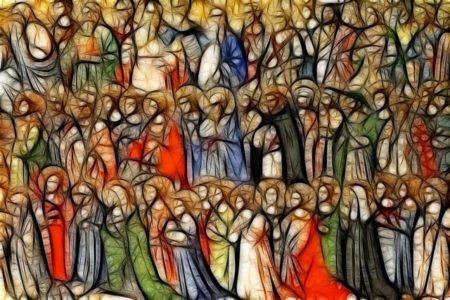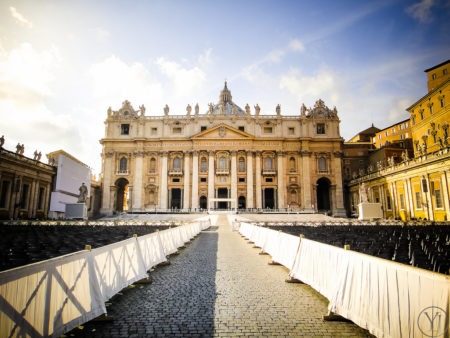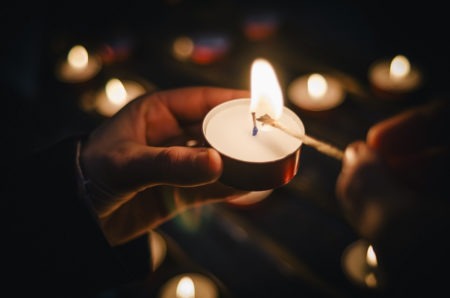Recently I visited Rome for a meeting of the Steering Committee of the World Methodist Council. Our meeting coincided with the 50th anniversary of the launch of the Roman Catholic-Methodist Dialogue. To mark that jubilee event, we had a private audience with Pope Francis and several lectures on the details of the dialogue process over these past 50 years. It was an incredible experience.
There were several things that I expected about this trip – to be wide-eyed at the beauty of the city. To be star-struck by Pope Francis. To be nervous amid the pomp and protocol of the Vatican and the Swiss Guards.
What I didn’t expect was to learn much about evangelism. I was wrong. My experience in the Eternal City taught me three important things about evangelism.
1) The importance of patience. The dialogue between the Methodist family of Christians and the Roman Catholic family of Christians has been going on for 50 years. It began with a commitment simply to talk. To learn about the other. Slowly, a depth of commonality emerged – shared theological understandings of God, Jesus, and the Holy Spirit. Of baptism, justification, and holiness. With each new discovery came a desire to continue talking and walking together, a commitment that is moving with joyful anticipation into the next 50 years.
Fifty years of conversation. Fifty more to come. Patience was, is, and will be crucial.
The same can be said of evangelism. We must be willing to walk with others for a long time, patiently nurturing a desire to continue talking, sharing, and learning. Patiently praying for the Holy Spirit to move within us, and between us, and through us.
If we are patient, as we walk and talk with others, we will uncover a depth of commonality and shared need. Why should it be otherwise? We are all human.
If we are patient, as we walk and talk with others, we will discover that God arrived long before we did – prepared the soil, planted seeds, watered and weeded and pruned in ways that we could never imagine or predict.
If we are patient, as we walk and talk with others, we will realize that the Holy Spirit works in two directions, transforming us, not just others. If we are patient, the Holy Spirit will open our eyes to the ways our story, and another’s story, and God’s story all intersect and intertwine. And if we are patient, those intersections can become opportunities to share our own experience of faith and point others to the center of that faith – Jesus Christ.
2) The power of imagery. This week culminates the wide-ranging celebrations that have marked 500 years since the beginning of  the Protestant Reformation. The Reformation was a powerful movement that opened a new chapter of spiritual growth and exploration. And yet, for all the wonderful things gained through this break with the Roman Catholic Church, I believe (at least) one significant thing was lost (or forgotten): the power of imagery. In our zeal for reform, we abandoned statues and imagery and focused on The Word to convey the profound spiritual truths of the Christian faith. But spiritual truth is always laden with mystery, and the Holy Spirit moves in ways that are often deeper than words alone can describe.
the Protestant Reformation. The Reformation was a powerful movement that opened a new chapter of spiritual growth and exploration. And yet, for all the wonderful things gained through this break with the Roman Catholic Church, I believe (at least) one significant thing was lost (or forgotten): the power of imagery. In our zeal for reform, we abandoned statues and imagery and focused on The Word to convey the profound spiritual truths of the Christian faith. But spiritual truth is always laden with mystery, and the Holy Spirit moves in ways that are often deeper than words alone can describe.
While in Rome I visited the Sistine Chapel, adorned with Michelangelo’s stunning frescoes. On the end wall is his vision of the Last Judgment taken from John’s Revelation. It is a powerful piece of art, almost overwhelming in its detail. And yet, at the center is the resurrected Christ. The entire scene revolves around him. You can see the holes in his feet from the nails of the cross, and the cut in his side from the spear of the Roman guard.
 As I focused, I realized this Christ looked completely different from other renderings I had seen. This Christ was full-bodied and strong. He was muscular and his posture exuded power and authority. His sheer physicality was remarkable.
As I focused, I realized this Christ looked completely different from other renderings I had seen. This Christ was full-bodied and strong. He was muscular and his posture exuded power and authority. His sheer physicality was remarkable.
I have always emphasized the whole-creation nature of salvation. When God’s kingdom comes in its fullness, it will be amidst the physical universe – not in some far away spiritual realm. And yet, gazing at this robust embodiment of God, the tangible and earthly nature of God’s future hit me in a new way. Seeing, rather than reading or hearing, heightened my spiritual awareness.
In evangelism, we can never limit God to words. This may seem counterintuitive given the age-old association of evangelism with preaching. But God is bigger than words alone can contain. And God reveals Godself to the whole of who we are – not just to our minds, but to our senses, our emotions, our intuitions, our passions. If we are to become channels of Holy Spirit transformation, we must be willing to discover or rediscover the power of images to convey truths much deeper than words alone can convey.
3) The significance of space. The steady growth in conversation between Methodists and Roman Catholics required space. Each had to create space for the other to inhabit. Each had to “make room” for the other before thoughts and ideas could be exchanged.
Though we may not describe it this way, at the heart of the Christian understanding of God is an understanding of space. When God created the universe from nothing, God first had to create space for it to inhabit. When God became human in Jesus, his open arms on the cross signaled that God had created space for humanity to return to fellowship. In all of God’s seeking and searching, God creates space within God’s very self, for each of us and for all creation.
Evangelism is about creating space – making room. We will never be able to share the gospel with others if we have not first made space for them in our lives and in our hearts. That space frees the Holy Spirit to do her* work so that lives can be transformed and God’s kingdom more fully realized.
How has travel expanded your perspective on faith-sharing? What have you learned when you are in a new setting? How have you practiced patience, valued the arts, or created space in your own posture towards others?
*It was common for some early church fathers especially in the East, including Aphraates, to refer not to the whole Godhead but individually to the Holy Spirit with feminine pronouns, such as in “The Fifty Homilies of Makarios,” a church father who influenced Count Zinzendorf and John Wesley.


 the Protestant Reformation. The Reformation was a powerful movement that opened a new chapter of spiritual growth and exploration. And yet, for all the wonderful things gained through this break with the Roman Catholic Church, I believe (at least) one significant thing was lost (or forgotten): the power of imagery. In our zeal for reform, we abandoned statues and imagery and focused on The Word to convey the profound spiritual truths of the Christian faith. But spiritual truth is always laden with mystery, and the Holy Spirit moves in ways that are often deeper than words alone can describe.
the Protestant Reformation. The Reformation was a powerful movement that opened a new chapter of spiritual growth and exploration. And yet, for all the wonderful things gained through this break with the Roman Catholic Church, I believe (at least) one significant thing was lost (or forgotten): the power of imagery. In our zeal for reform, we abandoned statues and imagery and focused on The Word to convey the profound spiritual truths of the Christian faith. But spiritual truth is always laden with mystery, and the Holy Spirit moves in ways that are often deeper than words alone can describe.  As I focused, I realized this Christ looked completely different from other renderings I had seen. This Christ was full-bodied and strong. He was muscular and his posture exuded power and authority. His sheer physicality was remarkable.
As I focused, I realized this Christ looked completely different from other renderings I had seen. This Christ was full-bodied and strong. He was muscular and his posture exuded power and authority. His sheer physicality was remarkable.









